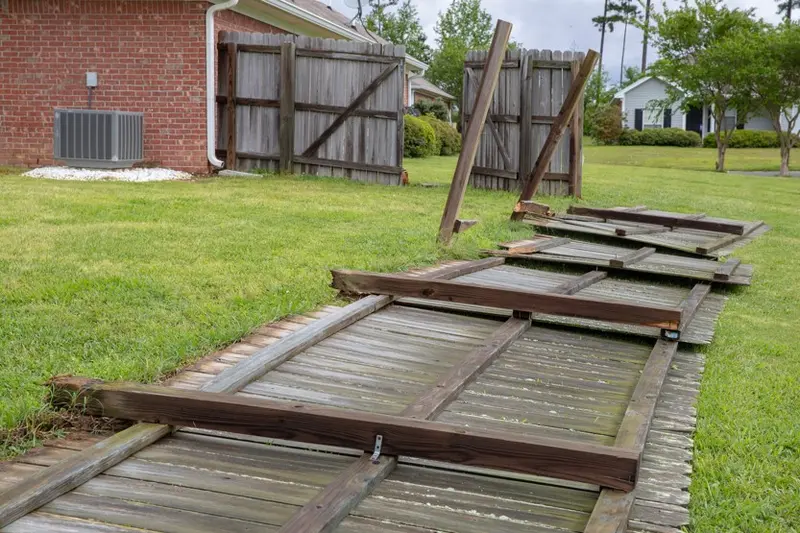Does home insurance cover fence issues, or will insurers leave you footing the bill?
For most people, several possibilities spring to mind when considering homeowner insurance and what they might be covered for. The obvious and most common reasons to make a claim owe to the usual suspects, such as fire, flood water damage (or any kind of water damage), theft, injury, wind, and hail. There is, of course, a pretty extensive list of things you are covered for in a property insurance policy – most of them are quite obvious.
But one particular and quite valuable part of the property is not often considered; the fencing that surrounds your home. Most people are simply unaware if a fence is covered until the worst happens and fences are damaged somehow. Many people wrongly assume that insurance does not cover fencing and fail to make a claim when they need to.
Valuable Addition to Your Property
Over the last decade or so, homeowners are beginning to spend more money on property fences, and with good reason. If you look around the average neighborhood, the most interesting and aesthetically pleasing properties usually come with a lovely-looking, well-built fence. Gone are the days when fencing was more of an afterthought – they are now a genuine home improvement consideration.
But with the rise in popularity comes a higher national average spend on fencing. Even a relatively standard fence will cost somewhere in the region of $2,000 to $3,000, while it is common to pay upwards of $10,000 to achieve an excellent quality fence around a large yard.
It stands to reason that these property investments should be covered by homeowner insurance. The good news is that, in most cases, they are. Even the most basic homeowner insurance policies offer cover against fence damage outside of your influence, control, or deemed a ‘natural act of god.’ Still, there are caveats and certain things you should be aware of. So, does homeowners insurance cover fences or not? Through this post, we will answer the question in a little more detail.
The Simple Answer
Depending on the cause, your property insurance will usually pay the costs of any damages to your fence. Most home insurance policies state that ‘other structures’ coverage protects your fence against damage caused by weather, natural disaster, and vandalism-related damage.
Loosely speaking, you are not covered against minor scrapes such as damage caused by gardening equipment or poor landscaping. Regarding the coverage level, most insurance pays for fence damage up to a predetermined portion of the entire coverage, typically 10% for most policies.
What Type of Damage Is Covered?
Standard house insurance does not cover harm to your fence through normal wear and tear, fungal infestations, mold spreading, termite infection, or poor landscaping. In general, if your house isn’t protected against a specific risk, neither is your fence.
Again, policies differ from policy to policy, but most commonly, the amount of coverage you have for property and construction other than your actual home is usually limited to 10% of your whole policy cover. Let’s suppose, for example, you have $400,000 of coverage on your actual home. That would equate to the various other structures outside of the main property being limited to $40,000.
In other words, your insurer will cover these other structures, such as your fence, up to a maximum of $40,000 worth of destruction, and should be covered by the insurer. Of course, there is a multitude of reasons why you might need to claim structural damage outside of your main dwelling. Let’s take a look at what some of the more common reasons to claim might be.
Fallen Tree
Your house insurance will almost certainly pay for the damage if a fallen tree has landed on your property and crashed into your fence. However, your insurance provider can decide not to pay for the damage if the tree was already fragile due to neglect or lack of upkeep.
Insurance companies normally only pay for something they consider accidental or an ‘act of god.’ Some insurance companies have been known to view a weak tree as a predictable and avoidable problem, but how they arrive at this decision is liable to interpretation. As a result, homeowners should always monitor the condition of all trees on and around their property.
Vehicle Crashes into Fenc
This is more common than you might think. Your homeowner’s insurance should cover the damage if a car crashes into your fence, and in most cases, they will. However, by making a claim against the driver’s auto insurance, you might be able to avoid using your house insurance in the first place.
Every state in America requires drivers to carry property liability insurance, which typically pays out at least $10,000 in damages. With that in mind, if your fence value exceeds the 10% rule and is worth more than $10,000, you may have to go through your property insurer or a combination of both.
If your home insurance cannot pay the full amount, you may also be able to claim the other driver’s liability insurance to assist with the bill. All of that being said – and this much should be obvious – your own vehicle insurance probably won’t cover you if you crash your own car into your own fence.
Storm Damage
If a storm damages your fence, including wind, lightning strikes, or other natural ‘acts of god’, you are covered, and the insurer is liable for any costs without question or delay. Rarely will an insurance company try to shirk the responsibility of covering against storm damage – it is by far the most common claim and almost always paid out.
Malicious Damage
Or, to put it another way, vandalism. Your homeowner’s insurance will cover your fence if it is vandalized unless the damage results from someone who resides in the property. If damage to your fence was caused by something other than a storm or an act of nature, you should also get in touch with your neighborhood police station to submit a police report.
Steps Before Claiming Against Fence Damage
Before you clean up or move anything after identifying damage to your fence, you should take pictures of the damage. This will help prove to your insurer that the damage to your fence was caused by vandalism, extreme weather, careless driving, or any other incident outside of your control by taking pictures of the fence. After that, speak with a contractor to estimate the harm done to your fence.
Something you should be mindful of is that you are likely better off paying for the repairs yourself and forgoing filing an insurance claim if the estimated total cost of fixing the fence is less than the cost of your insurance deductible.
The next stage in the process is to review the coverage in your house insurance policy – assuming that making a claim makes financial sense in the first place. The exact situations and financial amounts under which damage to your fence is covered are described in the section describing ‘other structures.’ Call your agent or insurer for information if you can’t find this detail, and ask them to point it out.
How to File a Claim?
Getting in touch with your insurance provider and submitting a claim after you have images of the fence damage and obtaining a rough cost estimate for its repair is essential. You can accomplish this by phone or online with most insurance companies.
The call center representative will ask you a few questions regarding the damage to determine whether the cost of repairs will exceed your deductible before enquiring about the type of harm done. You will then receive claim paperwork to complete either by email or post (as you prefer).
What If Your Claim Is Denied?
The insurance provider must provide you with a justification if the claim is rejected or the payout is irrational. If you disagree, talk to the adjuster and get a second estimate from a different contractor or adjuster. After you and your insurer have agreed, you could be offered part of the money upfront and the rest once the fence repairs are complete.
Wrap-Up
Making an insurance claim for fence damage is usually quite straightforward, and most insurers will settle with minimal hassle – providing the damage was caused naturally and not influenced by anyone residing in the house.
Alternatively, you can pursue fence cover as a separate, lone policy. Most insurers will have something that accommodates fence cover specifically, making the insurance claim for fence damage a little easier. However, we recommend making the most of your home policy without extra spending on the separate cover.
Either way, if you need any guidance or quick advice regarding an insurance claim for fence damage, we would be happy to steer you in the right direction. Feel free to contact us for any questions you may have.

